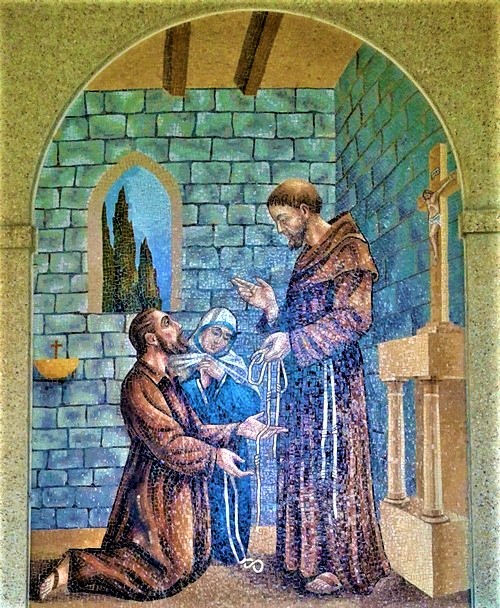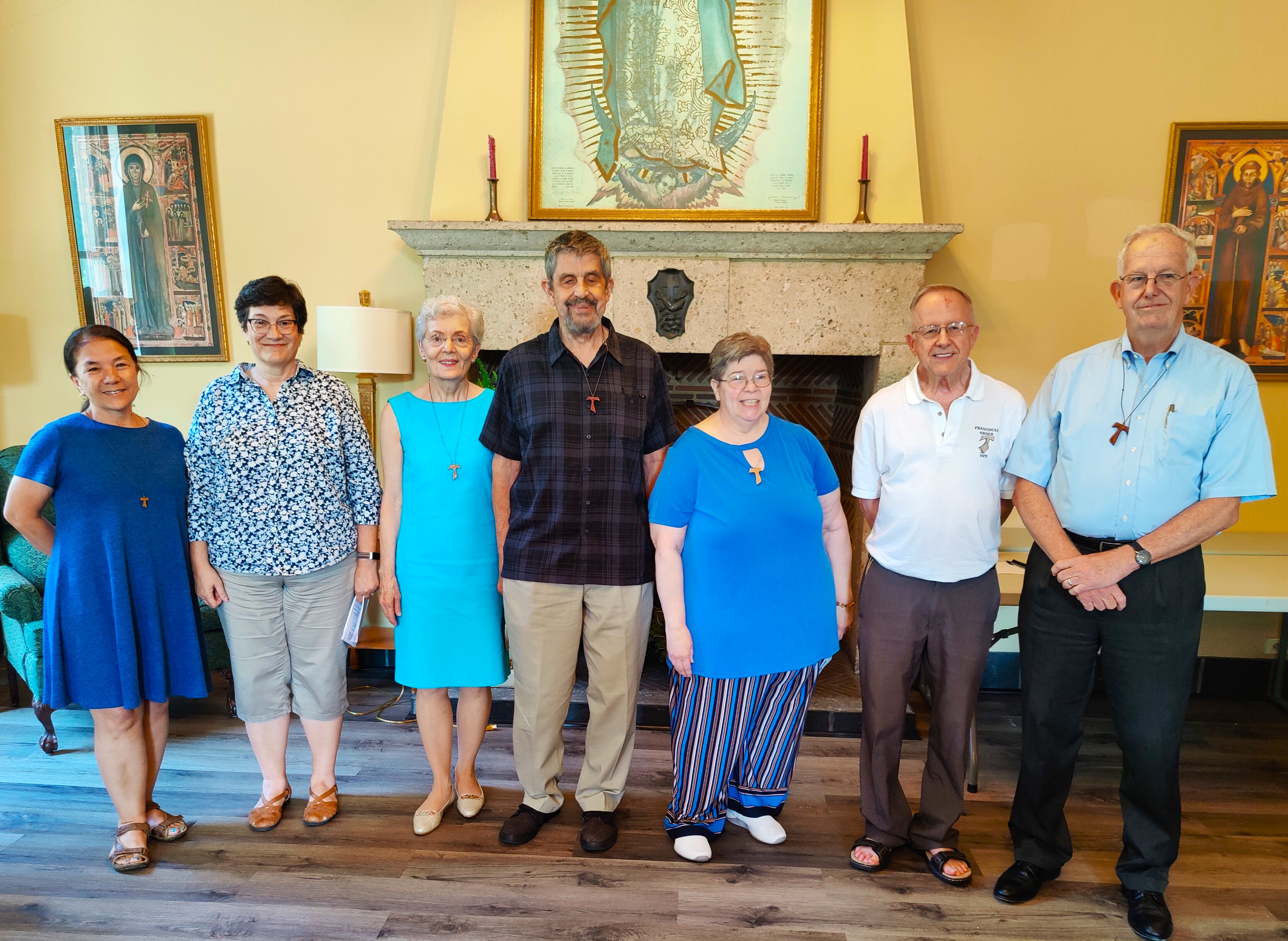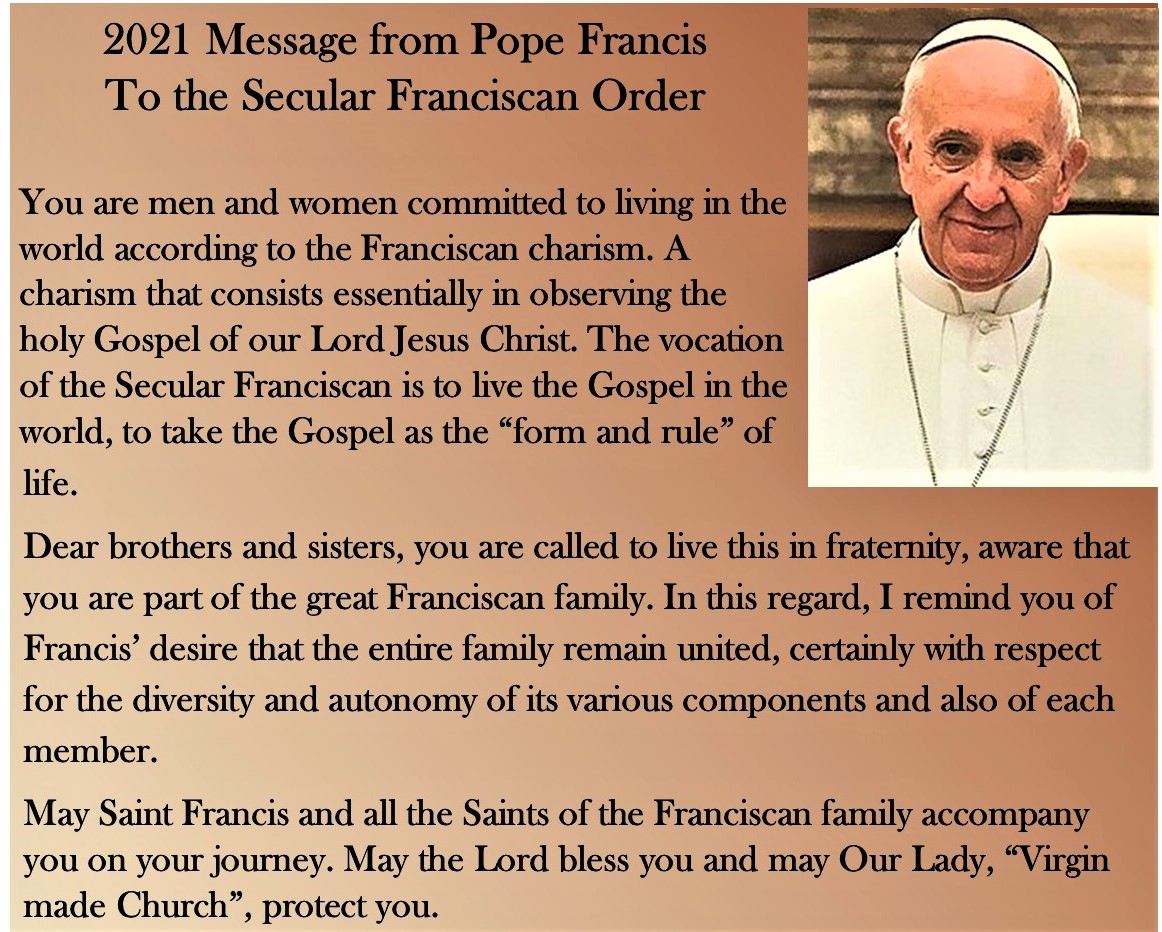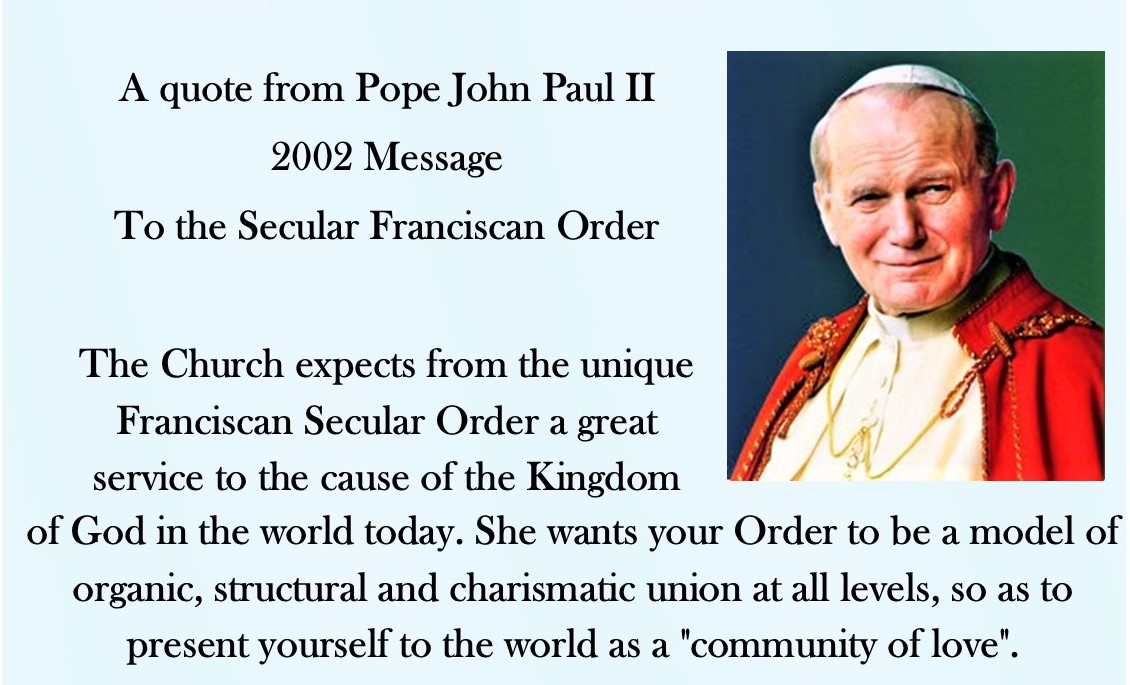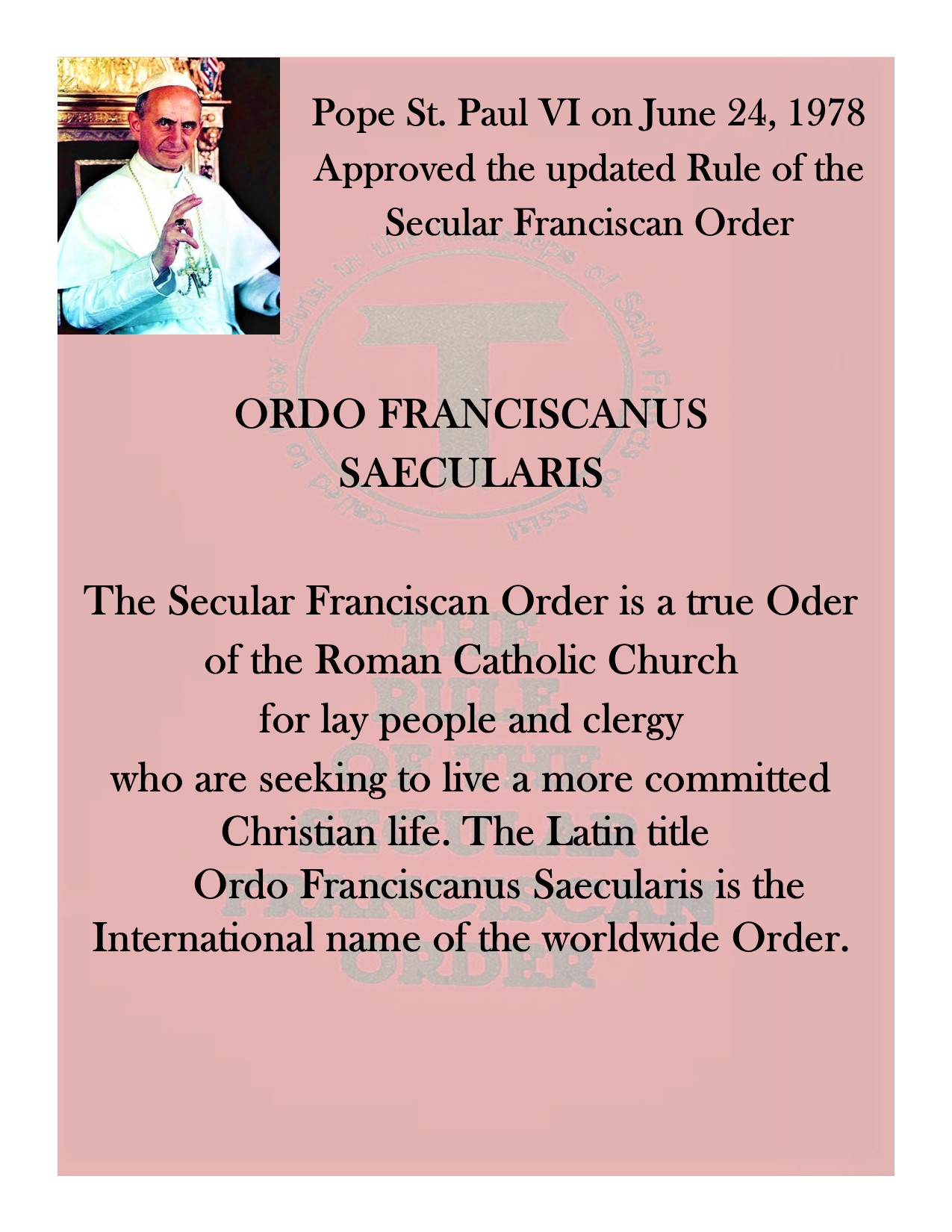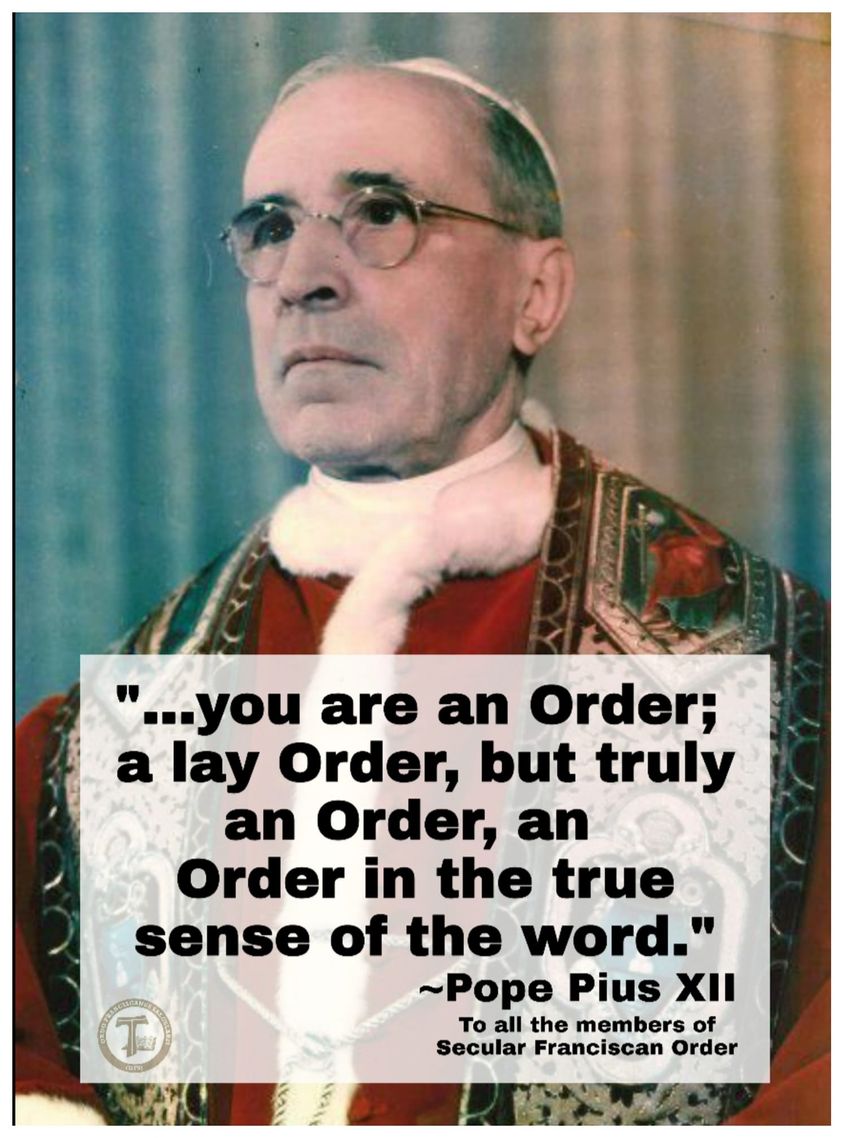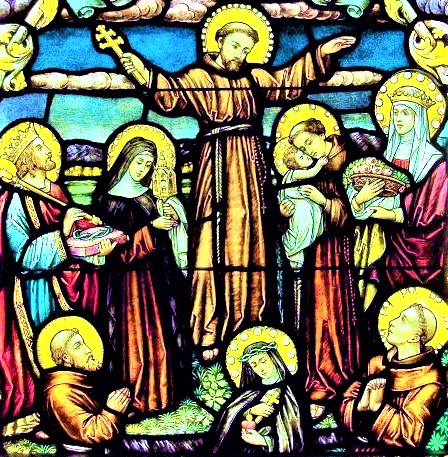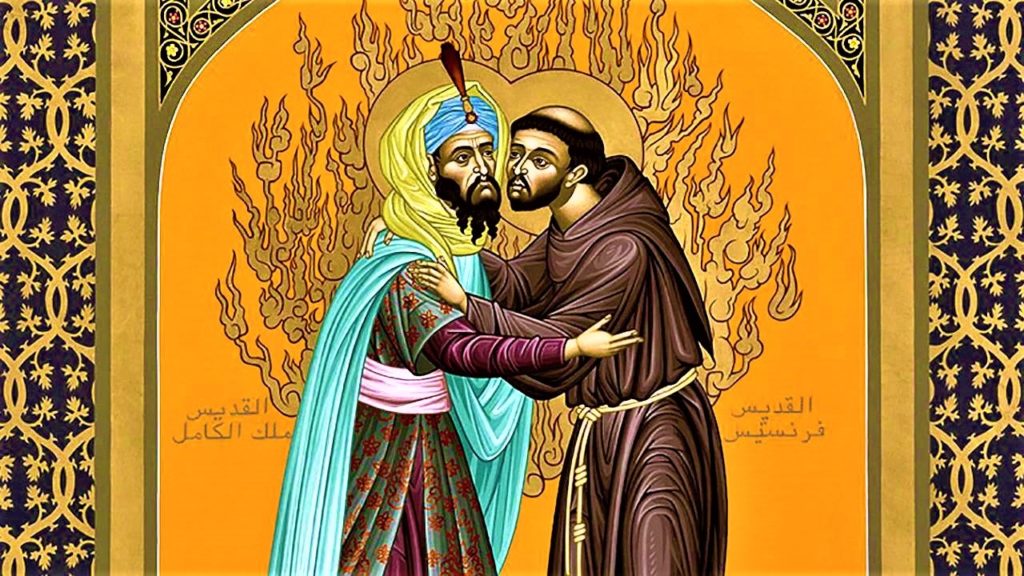Quote from Pope Emeritus Benedict XVI
“The point of the Third Order is to accept with humility the task of one’s secular profession and its requirements, wherever one happens to be, while directing one’s whole life to that deep interior communion with Christ that Francis showed us.” –Benedict XVI, Jesus of Nazareth, p. 79
**************************************************
Francis and the Sultan
FRANCIS AND WARFARE
THE FIFTH CRUSADE AND THE SULTAN
Francis felt called to be involved in the Crusades, but not to fight. He sought to enter into a dialogue with Islam. In 1212, he tried to go to Syria, but ended up in Dalmatia. In 1213, he attempted to go to Morocco via Spain. In 1219, he succeeded in getting to the Holy Land, arriving in Acre, and then went on to Damietta, Egypt, where the Crusaders were fighting Sultan Malik al-Kamil.
Although modern writers tend to express the view that Francis went to oppose the Crusade, he really went to “teach penance”, that is, his vision of human life as God intended it to be. This certainly included the concept of conversion; however, his contact with Islam demonstrated cross-cultural borrowing. Francis’ farewell message to the Order in 1219 made it clear he did not expect to return from the Middle East. He probably intended to seek martyrdom.
The Early Rule (23:1-4) calls the brothers to love their enemies and go to those who hate them. Francis called the Muslims “friends”, meaning nothing sentimental, but rather “brothers” or “fellow creatures of God”. Francis’ visit to the Middle East was an effort to live out his vision of the universal kinship of creatures and thereby earn eternal life.
There is source material describing Francis’ presence with the Crusaders’ armies at Damietta indicating he met with the sultan. However, there is no record of what happened in that encounter. The fact that Francis and his fellow brother Illuminato both returned alive and unharmed from the sultan indicates they were respected. It probably also indicates that Francis did not say or do anything disrespectful of Islam, but that the sultan asked Francis to pray for him to know the right path.
This visit was a key event in Francis’ life. At the time, he was almost alone in the mindset of a “dialogue” with one’s enemy. Back in Italy, Francis heard of the deaths of the five proto-martyrs in Morocco. They had provoked the Muslims and insulted the Prophet, and had been pardoned twice before their execution. In response, Francis stated: “Brothers should simply live the life of a Friar and preach only if inspired.”
In his Letter to the Rulers (of Europe), Francis was struck by the Muslim call to prayer five times per day and stated it was the responsibility of the rulers to call all people to prayer (until then only the religious elite prayed during the day). In 1224, Francis resigned as head of the Order, became ill, and went to the mountain of La Verna to spend the fast of St. Michael (September). On the occasion of the Exaltation of the Cross (September 14), he received the Stigmata.
**************************************************
We should reconsider the relationship with the world around us
Sometimes religions have produced a fragmented view of the world. Often at the center of philosophical and theological reflection was placed the human being, as if it were enough to center the attention on him to interest him in some way to the world around him. This is what Pope Francis defines the Praised be ‘ “excess anthropocentric” (116).
In truth, this centrality of man has not always gained a sense of responsibility towards creation, indeed produced a conviction of omnipotence, as if the rest of the animate and inanimate beings were working for it, I mean his desire for good or his whims and his sense of dominance. Just seeing the destruction of Creation operated by the continuous exploitation of resources, which does not stop even before the obvious disastrous consequences which is causing.
We should reconsider the relationship between us women and men with the world around us, assuming that we are all living beings, and therefore beings who have the right to existence. We must sharpen the eye and consequently the spirit.
Pope Francis speaks of integral ecology and the need to acquire an ecological spirituality and thus an “ecological conversion”. In Assisi, Francis as a man of the Gospel knew how to grasp the unity of creation. He spoke to the birds, the wolf, spoke to women and men, composed the Canticle of the Creatures. Everything is connected, every living being is only a fragment of a whole.
Only spiritual men and women, which is animated by a deep look that goes beyond the centrality of themselves, will provide answers that can be visions of a world in which everyone has to go out from self to conceive within a set, of which everyone is just a tiny part. But no other one-part die in loneliness and the curse, so everyone else, are human beings and other living things, will only be useless beings that feed or enemies to be eliminated.
We should now grasp the urgency of embracing the prophecy of Francis for the good of humanity and the entire universe so that everything is flooded with a process and a development that we are no longer able to control and to direct toward the good of all. (Ambrogio Spreafico, Bishop, president of the Commission on Ecumenism and Dialogue CEI)
**************************************************
You can Pray to God while you are Sleeping
What can God do during our sleep? Rest and sleep, if they are offered to God, become prayer. The Bible said so and is corroborated by many saints. For this evening prayer and the examination of conscience are so important: we fully fit in God, forgiveness, and mercy of God, and make us delve into the night sleep even though our will does not act during sleep time.
In fact, God does not rest day or night, and the Holy Spirit works in the soul always wake up – it is the body that sleeps -, so that grace may increase while we sleep. We learn from the Holy Scriptures, both from the Ancient to the New Testament.
We read that God calls the boy Samuel as he slept, although at first, they do not, and he realized God had to call three times until the priest Eli recognized that the Lord was calling him and he said to Samuel, who the third time he answered: “Speak, Lord, for your servant is listening” (1 Sam 3: 9).
Very significant is the case of the patriarch Joseph, to whom God does not speak except through dreams and his messengers’ angels. When Joseph doubts whether to accept or reject in secret his bride Mary, knowing that she was pregnant, “in a dream” an angel appears and tells him: “Joseph, son of David, fear not to take unto thee Mary thy wife, for that which is conceived in her, is of the Holy Spirit. She will bear a son and you shall call his name Jesus: for he shall save his people from their sins “(Mt 1: 20-21).
Always in a dream, God, through an angel, she ordered him to go to Egypt because Herod tried to kill the child. And despite being in a dream, Joseph did not doubt of divine inspiration and took mother and child and fled to Egypt (Matthew 2: 13-14). Always in a dream, Joseph knew that Herod was dead and that he could return to Israel, where he finally has settled with his family in Nazareth.
The Holy Spirit continues to work in the soul, which increases his grace even during the night while sleeping or resting. Several psalms speak of it, such as Psalm 16: 7, “I bless the Lord who counsels me; even at night my heart instructs me. ” Psalm 17: 3 says instead “Wise my heart, me by night“.
In the Bible, God often speaks in a dream to prophets, as you can see in the book of Genesis, or when talking to Aaron and Miriam (Num, 12, 6): “The Lord said, ‘Listen to my words! If there be a prophet among you, I the Lord, reveal myself to him in a vision, I will speak with him in a dream. ‘ “
This does not mean that dreams are inspired by God, for God rejects “divination or sorcery, or the wish or the magic” (Dt 18, 10). God spoke to Solomon in a dream also, on the hill of Gibeon, when he said: “Ask what I should give you” (I Kings, 3, 5).
It would take too long to make biblical exegesis of dreams. What is certain is that God is always with us, whether we are awake or asleep. Therefore it is important to look after evening prayers and ask God’s mercy after the examination of conscience. So we continue to pray during the night, even if you do not realize it. – SALVADOR ARAGONÉS – Aleteia translation of ZENIT
**************************************************
The Franciscan Humility Challenge
by – Friar Casey Cole, OFM
Christmas was probably the most important celebration for St. Francis. While Easter celebrates the Resurrection of our Lord and the fulfilled hope of our salvation—a pretty big thing to celebrate for sure—Christmas marks the end of our waiting and the beginning of the fulfilled promise. As Simeon says in the Gospel of Luke, “My eyes have seen the salvation which you prepared in the sight of every people, a light to reveal you to the nations, and the glory of your people Israel” (Luke 2:30-32). The Incarnation for Francis was the height of human history: God became human. What a marvel. What a miracle. What a joy of our faith.
So what does this have to do with beginning the Christmas planning on November 1st like those needing to sell us something? Well, because it was such an important feast for St. Francis, he exhorted his friars to prepare for it to an even greater extent than the Church required in the season of Advent: “Let them fast from the Feast of All Saints until Christmas” (Rule of St. Francis III.5).
For us, fasting doesn’t have to mean the literal use of the word, that is, to abstain from food or drink at certain times; fasting can mean abstaining from luxuries more broadly or even being more intentional with our time so to do something more purposeful, like prayer.
This year, I have come up with something new, and I would like to invite anyone who is interested to try it with me. We all know that humility was probably the highest desire of Francis’s life, that he wished to always be the lowest and least important. We also know that one of his chief reasons for loving this virtue so much was in fact the Incarnation, the humility of God to become human, to be born in such an insignificant way, and to be presented to shepherds, among the dirtiest and least important people of society. For this reason, I will be taking the newly created and aptly named “Franciscan Humility Challenge.”
The purpose of this challenge is to actively seek opportunities to give up control and to be humbled every day. What do I mean by this? Well, so much of our lives is working to get our own way. In our jobs, relationships, families, and interactions with strangers, we find ourselves in conflict with others who want something different from us: Who is in charge? What movie should we watch? Where should we go? Whose turn is it? Who gets to make the decision? Conflicts can range from inconsequential decisions like which station to listen to on the radio in the car, to significant decisions like which car to buy.
For me, what I see in these situations is an opportunity… an opportunity to exercise my ability to be humble like Jesus. The practice of letting go of my will and letting others make decisions, humbly assenting to the desire of someone else, is not just nice pleasantries to keep people happy. It is an active decision to imitate the will of our Lord Jesus, “who humbled himself even to the point of death, death on a cross,” and to put into practice what I pray every day in the Our Father: “Thy will be done.” It’s no coincidence that these words follow immediately after “Thy kingdom come“: the true reign of God’s kingdom is the complete submission of our wills to the will of God. The Kingdom of God is trusting in God above all else.
But how can we expect to do that, a great task, if we struggle to give up our wills in even small situations? Like anything that is difficult, we need practice and preparation to be ready. Why not do so now as we prepare for Christmas, the celebration of God’s great act of humility?
If you feel up to the challenge, I feel a need to clarify two things. The first is that humility cannot be confused with being a doormat, that is, letting others cause us harm because we are unable to stand up for ourselves. Submitting our will to another must always be done willingly, and from a position of privilege and self-assurance. It is our very confidence in our situation, in who we are and who God is, that allows us to give up our will and accept the consequences. If it is done out of fear, under compulsion, or desperation, this is a different situation. There is a huge difference between humility of will and allowing ourselves to be abused, and we need to make sure we know the difference.
The reason for this is the second point, and ultimately the whole point of the challenge: we are doing this to imitate Jesus and so share in the Father’s joy. If we submit our will to another but in doing so feel angry or hold resentment towards the other, we have missed the point. The point is to be free of our need to be in control and to take joy in the fact that God is in control. This is the great joy of our Christmas celebration and the truth that we hope to make true in our lives.
**************************************************
God Is Not the One Who Punishes
by Friar Jim Van Vurst, O.F.M.
Over the centuries, changes in culture have affected the way believers—even the Church—view God. That is because it is natural for us to project human flaws and weaknesses directly onto God, as absurd as that must seem.
It is common for religious people to attribute natural disasters as a punishment by God for sins. If that’s true, then God’s aim is off-target because it’s usually the innocent who suffer rather than the guilty. Why are the millions of innocent refugees that we see in the Middle East suffering so terribly instead of the dictators who caused it all?
We must realize that God created humanity in a perfect state. It is humanity that causes chaos. There is no question that God gives us the grace to be good and avoid sin. God never denies help. But at the same time, God never pushes or violates human freedom. Why? It is the gift of freedom that allows humanity to love. Unfortunately, sinful humans can also cause suffering to their brothers and sisters. God sees the possibility of love as more important than the possibility of evil. Remember, with no free will, humans would be animals. Evil in the world is humanity’s doing.
Salvation in God
In the Old Testament, when the Israelites strayed from God’s commands, it was not God who zapped them with a lightning bolt. Rather, it was the Jewish leadership that became weak and corrupt. When that happened, they were easy targets for neighboring tribes. In other words, God did not send the Israelites into exile. They were taken there because they were easy prey for Nebuchadnezzar, the Babylonian king. They punished themselves.
Think about the current situation in the United States. From everything that we see in the news, it seems that we as a society are in the midst of a moral crisis—perhaps not unlike those in the Old Testament. There is an increase in violence toward children, women, and the unborn; a growing philosophy of “me-first” at any cost; corruption among those with power and influence; and, finally, a lack of interest in those who are vulnerable. It has been said that the true criterion for civilization is how it takes care of those who cannot take care of themselves.
What appears to be happening is not so much that society is setting itself up for God’s punishment. Rather, if the trends continue as they are, our society will collapse from internal corruption and self-destructive acts. If we throw out God’s basic commandments forbidding murder, lying, stealing, and sexual immorality, what happened in the Old Testament will likely happen within our own society.
Some might look up to God and ask why. Actually, our society should look at itself and say, “Well, of course! How could we not have known this would happen?” God’s grace cannot be cast aside without some negative results. That’s been proven since the beginning of humankind.
God Is Love
Many people see God as a judge. Not true. Ultimately, we all judge ourselves. God is a loving Father who is all about finding us when we are lost. What is so startling with all of this is that God does not put anyone who is wandering on a time limit. We can never say that someday God will give up. As long as there is a breath in a human being, God offers sufficient grace to bring that person into his arms.
Humans regularly give up on their brothers and sisters. Humans can run out of patience rather easily. God never runs out of patience. The reason? Each and every human person is God’s child. One person is of so much more value than the entire universe.
I say this to you, my readers, who fear for their loved ones who seem lost, wandering, getting into trouble of their own making. Pray for them. But also know and understand that the Lord will not abandon them. He did not abandon Dismas on the cross, Peter in the courtyard, or even Judas.
Jesus’ image of the good shepherd is not just an image. Your loved ones are his sheep, too, even if they are wandering.
SEEKING THE FACE OF GOD
Salvation history, that is, the account of God’s saving interaction with humanity. The Old Testament narrates how, after creation, God, in spite of original sin, again offers human beings the possibility of His friendship through the covenant with Abraham and the path of a small people, of Israel, whom He chooses not according to the criteria of earthly power but simply out of love. … For this task He used mediators, like Moses and the prophets and judges, to communicate His will to the people. They recalled the necessity of faithfulness to the covenant and kept alive the hope of the full and definitive realization of His divine promises.
God’s revelation reaches its fullness in Jesus of Nazareth. In Him, God visits His people, He visits humanity in a way that goes beyond all expectations. He sends His Only Begotten Son; God himself becomes man. Jesus does not tell us something about God’s nearness, doesn’t simply speak of the Father: … He reveals the face of God to us. Within Jesus’ statement, “‘Whoever has seen me has seen the Father‘ … the newness of the New Testament is contained. … God could be seen, God has revealed His face, He is visible in Jesus Christ.
To search for the face of God throughout the Old Testament, that is, for “a ‘You’ who can enter into a relationship, who is not locked away in His heaven, looking down on humanity from on high. Certainly, God is above all things, but He turns toward us and listens to us: He sees us, speaks, extends covenants, and is capable of loving. Salvation history is the story of God with humanity. It is the story of this relationship of God who progressively reveals Himself to mankind.
Something completely new occurs, however, with the Incarnation. The search for the face of God is unimaginably changed because this face can now be seen. It is that of Jesus, of the Son of God who is made man. In Him, God’s path of revelation, which began with the call of Abraham, is fulfilled. He is the fullness of this revelation because He is the Son of God as well as ‘the mediator and the fullness of all revelation’. In Him coincide the content of Revelation and the One who reveals … Jesus, true God, and true man, is not simply one of the mediators between God and humankind, but is ‘the mediator’ of the new and eternal covenant. … In Him, we see and encounter the Father. In Him, we can call God by the name of ‘Abba, Father’. In Him, we are given salvation.
The desire to truly know God, that is, to see the face of God, is inherent to every human being, including atheists. Perhaps we also, unconsciously, have this desire to simply see who He is. … But this desire is fulfilled in following Christ thus … we finally see God as a friend. What is important is that we follow Christ not only when we need Him or when we find a minute of time among our thousands of daily tasks. … Our entire existence must be directed toward meeting Jesus Christ, toward love for Him. In such an existence, love for our neighbor must take a central position; that love that, in light of the Crucifix, allows us to recognize the face of Jesus in the poor, the weak, and in those who are suffering. – Pope Emeritus Benedict XVI January 2013
